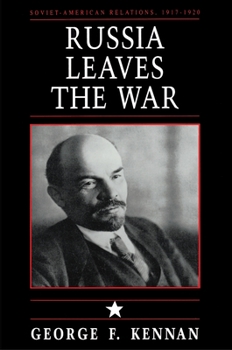Soviet-American Relations, 1917-1920, Volume I: Russia Leaves the War
(Book #1 in the Soviet-American Relations Series)
Select Format
Select Condition 
Book Overview
Winner of the Pulitzer Prize in History, the National Book Award for Nonfiction, the George Bancroft Prize, and the Francis Parkman Prize, this absorbing volume explores the complexities of the Soviet-American relationship between the November Revolution of 1917 and Russia's final departure in March 1918 from the ranks of the warring powers.
Format:Paperback
Language:English
ISBN:0691008418
ISBN13:9780691008417
Release Date:November 1989
Publisher:Princeton University Press
Length:576 Pages
Weight:1.72 lbs.
Dimensions:1.5" x 6.1" x 9.1"
Customer Reviews
2 ratings
For those interested in this area; a really good overview
Published by Thriftbooks.com User , 15 years ago
Needless to say, this book will not be of interest to the vast majority of the reading public. If you are already interested or think you may become interested in Russian-American relations from the end of WWII into the Russian revolution, give it a look. Kennan is a good writer who is able to focus on the important issues and keep it interesting. I have already read two other books on this period because of my collecting interests, and was pleased to add to my knowledge with this volume. (I have not read Volume II.)
The Foundations of Soviet-American Diplomatic Relations
Published by Thriftbooks.com User , 19 years ago
Russia Leaves the War, Volume I of George F. Kennan's history of Soviet-American Relations, 1917-1920, describes the chaos that the Bolshevik seizure of power produced in US diplomatic circles in the months immediately following the November 1917 revolution. Kennan, who passed away in March 2005, was a leading authority on Soviet-American diplomatic relations and the author of the policy of containment which served as the basis for American policy toward the Soviet Union from the late 1940s to the 1980s. In Russia Leaves the War, Kennan provides many valuable insights into the earliest diplomatic relations between the US and Soviet governments. Some examples: The Tsar was deposed in February 1917 and replaced by the Provisional Government led by Alexander Kerensky. This event appears to have been one source influencing the US decision to enter WWI in April 1917 because it allowed President Wilson to present his decision as one to support the forces of democracy against the forces of authoritarianism. (Naturally, Germany's unrestricted submarine warfare and attempts to incite Mexico against the US were also major factors in the decision.) The perception of Russia by the US in the months following the February Revolution was based on the wildly idealistic and optimistic view that Russia would rapidly develop into a western democracy sharing our values and goals. In reality, Russia had no heritage of democracy and individual liberty remotely comparable to the one we received from England going back at least to Magna Carta (1215). The treaties creating the Triple Entente (Britain, France and Russia) contained secret provisions regarding territorial adjustments, spheres of influence, and indemnities to be paid by the Central Powers after their defeat. The US was not a party to these treaties and, in fact, insisted on referring to itself as an "associated" rather than "allied" power after entering the war. In late 1917, Russia was a defeated power. The army was demoralized both by military defeat and Bolshevik agitation; the troops were deserting. The Provisional Government was incapable of simultaneously continuing to fight the Central Powers and establishing itself as the new government of Russia. The Bolsheviks exploited this situation by openly calling for a general peace without annexations or indemnities, without prior consultation with Russia's allies, and by openly publishing and denouncing the secret treaty provisions as imperialist plots. The Bolshevik goals were to rapidly negotiate a separate peace with Germany, consolidate their power in Russia, drive a wedge between their former allies to prevent them from pressuring Russia to continue the war, and to promote communist revolutions throughout Europe by appealing to the masses to rise up against their governments. The US diplomatic presence in Petrograd in November 1917 was almost as chaotic as the Russian political situation. The US Ambassador, David Francis, the former Mayor o






